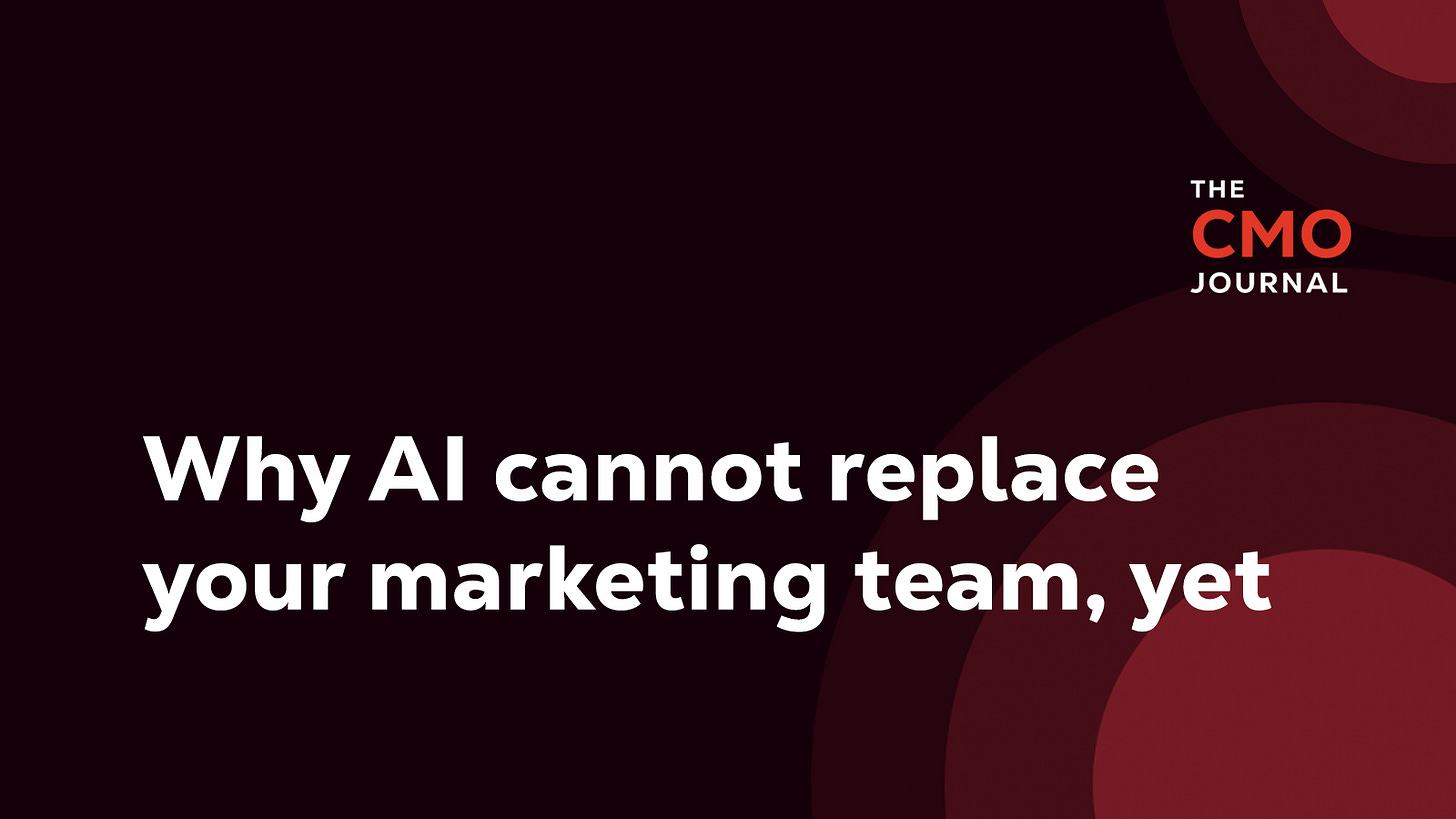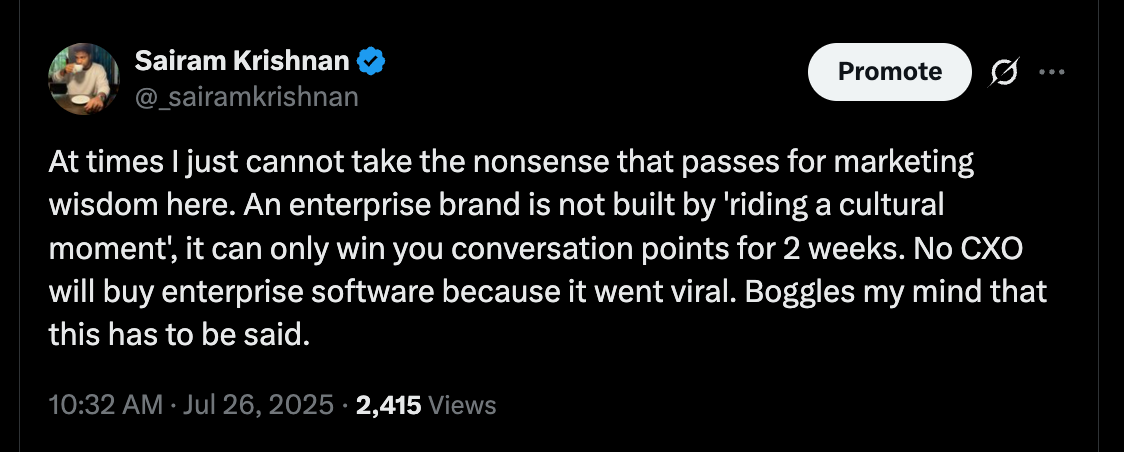Why AI cannot replace your marketing team, yet
And why in-house marketing teams are going to matter even more
In the last few months at least, there’s been a particular kind of post that has become very popular on LinkedIn. It’s about how, with AI, founders are able to do so much with so less. In this, there’s a particular sub-genre, which I call 'mud-slinging at marketers'.
It basically goes like this: Look how easily I can do this, this, and this. I only use AI and have contractors in far away countries who I pay a fraction as compared to on-roll talent. Why should I hire anymore? I’m at x million ARR already without a marketing team.
It’s tiring to point out all the fallacies here, but I felt like I needed to, because this idea is going a bit mainstream. It’s harmful, both for the people who are peddling this nonsense for likes, and for those who will be affected by it.
As a starting point, let me put forth that this was always what the engineer-founder wanted: To eliminate the marketer. There’s nothing wrong about this if you see it from their perspective. Engineers want to build stuff, and selling what they make is not in their immediate instincts, it’s not what they enjoy. Which is why engineer-founders have always loved PLG and viral motions. Having to not rely on marketing and sales is the dream for someone who just wants to code.
The issue with this thinking is not that it can’t work. Sometimes it actually does. The problem is that it just cannot work for all products and for everyone.
For example, if you are building an SMB product for an audience that you already have some amount of distribution for, then great. You can outsource most of the marketing, and have minimal impact on things like brand and customer experience, because your churn will be high anyway, and you’ll rely on marketing (or some kind of PLG/content motion) to keep replenishing the funnel.
But if you are building a product for the enterprise, this just won’t work. To make an enterprise trust your offering, you need to not just attract attention. That’s just the first step. You need to build trust, you need to show off your product in a way that the trust becomes confidence, and then you need to have customer support and enablement deliver in a way that justifies every dollar of their spend on you.
All of this requires months and years of work. You need to have a brand marketing motion that can attract attention consistently. You need a product marketing motion to position, explain, and wow the enterprise buyer about your product’s capabilities. And then you need an enablement motion to help the actual user bring out your product’s full capabilities.
All of the above are just simplifications. There’s a lot more than that to do before an enterprise buyer will trust and buy you.
But again, everyone seems to have forgotten this in the current AI-can-do-everything climate: It’s not enough that you acquire customers. You have to keep them too.
And to win, wow, keep customers, and build a business, you need to do all the above over and over again. Contractors and AI are not going to help you do all of this at the scale you need.
Can contractors help, though? Of course they can. Tactically deployed, they can be game-changers in terms of speed and execution. But can you run a full-fledged marketing motion by just outsourcing everything to AI and contractors? I’m not sure you want to do that. You are setting yourself up to fail.
I’ll end this with why an in-house marketing team matters, and why, in every startup I have worked at, the decision was always to build marketing in-house: Because in-house talent compounds. The understanding of product, audience, ICP, and company dynamics means that in-house teams will just move faster. The amount of time you will spend on trying to get the same kind of output from elsewhere is simply not justifiable.
Does this mean you don’t use AI? Of course not. You use AI every step of the way. The point here is that an experienced, motivated, and knowledgable in-house team that is great at using AI will beat absolutely anyone else. This is what you need to deploy for your startup as a founder. Because when you started out, the goal probably wasn’t to build a lean business.
It was to build a great one.
Dear readers, a couple of things:
I told you in May that we will have a WhatsApp community of readers. I will make that happen this month. Watch your inbox, those who have emailed me. And for those who want to join, please email me at sairamkrishnan@outlook.com. Remember to include your phone number.
In October, we will have a closed meetup. I have finalised locations and stuff, but this will (obviously) follow the WhatsApp group and a packed September at work.
I apologise all of this took so long, but it has been a remarkably tiring year, and I’m struggling to keep at everything, including the writing. But no worries, we carry on.
If you haven’t yet subscribed to this newsletter, here’s your reminder to join more than 5000 (really smart) readers. The next dispatch will be about how we thought about and executed community marketing at Atomicwork.
PS - After a long time, I wrote something not about work (about motorycling, life, and attention). It’s on my personal blog, and you can read it here.



Loved the blog you have attached at the bottom of this letter :)